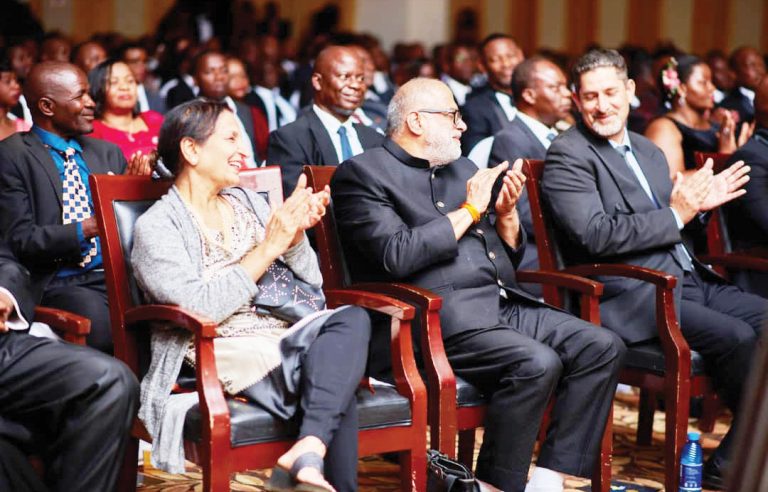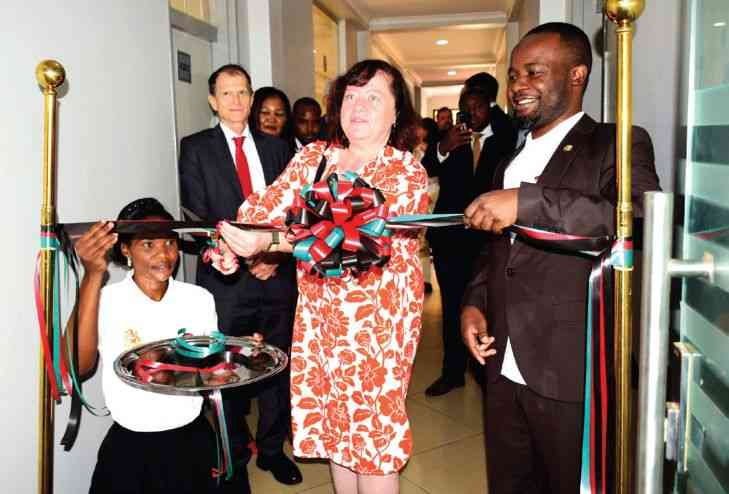HSBC, Europe’s biggest bank, moved around vast sums of dirty money as the global banking system continues to enable laundering. The illicit flaws include millions from resource-deprived Malawi. When that happens, Malawi’s poverty worsens but its criminal justice system can’t cope either, Golden Matonga writes.

In February 2015, the Financial Intelligence Authority (FIA) wrote to the Reserve Bank of Malawi (RBM), alerting the Reserve Bank about a number of companies it suspected were illegally externalizing Malawi’s thin foreign currency reserves.
The Reserve Bank reacted by setting up a task force to further investigate the tip and subsequently prosecute the culprits. Among the companies of interest was Intertrade Agency, owned by Mahomed Rafiq Amad.
Among others, the investigators were interested in activities in the obscure company’s CDH account –opened two years previously on 12 August 2013.
They collected all documents related to the account’s foreign currency transactions.
According to The FinCEN Files—a global investigation by some 400 journalists and 100 media houses across the world led by Buzzfeed and International Consortium for Investigative Journalists (ICIJ) Vic Charms accounts domiciled at HSBC Hong Kong-based affiliate, Heng Seng Bank, by mid-2013, sent or received more than $80 million through HSBC Hong Kong accounts.
The figure is just a tiny fraction of the vast sums of money HSBC and its affiliates across the world facilitated despite the U.S. Justice Department’s decision in 2012 to forgo indicting HSBC or any bank executives in the Sinaloa cartel case, revelations about how the bank facilitated money laundering for one of Mexico’s biggest drug cartels.
Then, the decision was opposed by rank-and-file prosecutors, who had prepared a list of up to 175 criminal charges against the bank that the government ultimately shelved.
No one went to prison over the bank’s historic wrongdoing. The findings also raise questions about the department’s decision, five years later, to pronounce HSBC reformed and allow its probation to lapse.
Hence while under such scrutiny, HSBC enabled Amad—owner of an obscure company, Intertrade, to transfer $3.8 million, a king’s ransom in Malawi, to Vic Charm, a shell company.
By 2015, little-known Amad would be arrested by police and charged with externalization of forex. Seven years later, as confirmed by the Reserve Bank of Malawi to ICIJ and The Nation, the trial remains to be completed, highlighting challenges facing the resource-constrained and corruption-ridden Malawi, in fighting financial crimes.
A year before Amad opened a bank account at CDH bank in Blantyre, cashgate scandal—Malawi’s biggest corruption scandal erupted.
Some K24 billion kwacha was stolen from state coffers by businessmen conniving with senior civil servants and politicians between June and September 2013 alone.
Two years prior to cashgate, Malawi faced one of the most acute shortages of foreign currency reserves the country has ever witnessed, a development that nearly brought the economy to its knees, amid long fuel queues emerged, drugs scarcity, incessant power outages.
When on 9th September 2013, Mahomed Rafiq Amad, wrote to Malawi’s CDH bank applying for remittance of USD423, 000 to Vic Charm, his account had only been active for a month—opened on 13th August 2013. His company had just been registered five days before the application was made.
Even for long-term accounts, to convince the bank to facilitate the transaction, Amad was supposed to have a good reason for the transfer or risk the bank rejecting the request. He also ought to have proper paperwork.
Amad told the bank, he wanted to purchase 1800 tons of cotton seed that will be sold to Malawi’s cotton growers, purportedly boasting the local agri-based economy.
A single ton of cotton seed, Amad told the bank, was worth 170 USD and the total amount of purchase was $306 000.00.
For his paperwork, Amad supplied the bank with a supplier invoice and Customs Bill of entry as supporting documents, and instructed the bank to debit his account at the bank, number 002013509220.
He also attached an invoice supporting the transfer from Mozimpex Mozambique, a company whose address is Box 172, Tete, Mozambique.


One of the Mozimpex invoices, sourced by ICIJ and PIJ, The Nation, was signed by its Export Manager Zuined Omar Rodrigues to TS Distributors, asking for $350 000 dollars.
“My team established that the Account Number 0020135092200 which was opened on 13th August 2013 has been used to facilitate money laundering, tax evasion, and illegal transfer of foreign currency out of Malawi, through use of forged import documents, and further the money going through the account originated from other business accounts of which Mr. Mahomed Rafiq Amad had controlling interest. This includes Mozimpex. No imports ever arrived in Malawi with respect to foreign currency which was externalized,” concluded an investigator working for the Reserve Bank of Malawi.
A check at the registrar’s office in Hong Kong by ICIJ and The Nation shows that Vic Charm was registered by a man known as Saddiq Satar. Little else, could be found about Saddick Satar Rawani. The company registration indicates the company was registered on 15th October 2012, a year before the transaction. On the registration form, Rawani states he is resident in China.

The transfers to Vic Charm were in seven trenches; made using Customs Declaration Form Number C79 of 31/08/13 and Customs Declaration Form Number C80 of 31/08/13 purportedly to pre-clear imported cotton seed:
?20 August 2013 USD50, 500.00
?22 August 2013 USD100, 000.00
?23 August 2013 USD156, 000.00
$768 000. 00 was paid to account number 238 535 592 as follows:
?20 August 2013 USD50, 500.00
?22 August 2013 USD100, 000.00
?23 August 2013 USD156, 000.00.
“This is to say, a single Form 12 was used against several invoices on different dates to pay large amounts of forex for importation that was not done,” recorded the investigator.
“Common Thread”
ACCORDING to Thabo Nyirenda, a prosecutor for the Reserve bank of Malawi the Amad case has a common thread in the externalization of Malawi’s limited resources: disguise of the funds as payments for imports vital for Malawi.
Another prosecutor, who asked not to be unnamed, cited a case of a Coal Mining company that in 2008 externalized USD 600 000 to Switzerland claiming it was procuring new machinery which to date is yet to reach the country.
“Remember Switzerland is not a manufacturing country, it’s a tax haven with strong secrecy laws. Before the financial crisis which prompted some changes, you could open an account with just a number for identification without even providing a name,” said the source.
Even after being accused of failing to stop Cashgate in 2013 Malawi’s banks continue to play a passive role in fighting money laundering. Even after being sanctioned for illicit financing, HSBC flagged the transaction but proceeded to let the transaction proceed.
“The current report shows that the perpetrators of illegal externalization connive with bank officials who make it possible for transactions to be conducted without supporting documents, duplicating documents and transactions,” reads a 2018/2019 annual report by Malawi’s Financial Intelligence Authority (FIA).
In 2018, three years after the Amad case, the FIA (Financial Intelligence Authority) became aware of a syndicate where officials of a financial institution colluded with foreign nationals to externalize over K4 billion within a period of one and a half months without supporting documents.
According to a Reserve Bank of Malawi 2018 country report, Malawi lost a whopping USD394.60m (MK239.27 billion) in illicit forex externalization done under the guise of transfer pricing.
By September 2019, the bank says it had successfully and conclusively prosecuted several cases of illegal foreign exchange externalizationFinCEN files amounting to K587 million.
The Global Financial Integrity, a research and advocacy organization estimated that in the ten years 2005-2014, Malawi had lost between $2.26 billion (about K1.6 trillion) and $7.32 billion (about K5.3 trillion) due to illicit financial outflows.
According to anti-poverty charity, Oxfam, these illicit financial flows (IFF) are hurting some of the poorest people on earth, translating into substantial lost tax revenues for the Malawian people since illicit flows are, by definition, untaxed.
“In 2014, the (Malawi) College of Medicine, showed that the revenues foregone from IFF plus the then government health spending would be sufficient to cover the minimal public health package (EHP) for all Malawians and would help tackle Malawi’s disease burden; which could well be true in the current context,” said Oxfam Malawi Country Director, Lingalireni Mihowa.
Yet banks continue to miss such red flags, says Nyirenda the prosecutor, arguing Amad’s case as a point in case.
“The payments for cotton seeds from Hong Kong should have triggered red flags. The same with payments to jurisdictions such as Pakistan or mining equipment you have referred to. So why didn’t the banks or the clearing agency raise a red flag or stop the transactions,” said Nyirenda.
According to Nyirenda, who has years of experience prosecuting financial crime, the main source of the money being externalized is the public purse with foreign companies and Malawians of foreign origins who profit from deals with government, including corrupt ones, externalizing the proceeds.
Case Laundering
THE RESERVE BANK, Malawi Revenue Authority (MRA), and Fiscal Police continue to arrest money laundering suspects but cases of money laundering connected to powerful business persons are dragging on for years.
That, our findings reveal, might not all be coincidence.
Seven years after Amad was arrested, his case is not yet concluded, a spokesperson for the Reserve Bank confirmed.
In total, the Bank alone is currently ten cases involving some USD 20miliion. But all the cases are progressing.
It’s been seven years since Amad was arrested, but justice has not been served. No accomplice has been arrested. Saddick Sattar Rawani remains a phantom.
It’s an eerily familiar pattern for such cases, sources in the Justice system say.
A review through interviews with several lawyers suggests various state prosecuting agencies are underequipped to prosecute all the financial crime cases on top of other criminal matters.
As a result, a backdrop of cases piles up. Several cases, as a consequence, are increasingly outsourced to private prosecutors.
But there is something else, too. Murmurings about cases being compromised deliberately are also getting louder.
Two years before Amad opened his account at CDH account and externalized US$3,792,000.00, some four businessmen were arrested for charges similar to Amad’s.
The four, Karamat Ullah Chaudhry aged 32 of Newlands, Chigumula, Blantyre, and Lakhu Mohamed Naeem M Iqbal aged 28 of Newland, Chigumula, Blantyre, and Shiriraz Fererra, were accused of forgery of official documents contrary to section 358 of the Penal Code (Cap.7:01) of the laws of Malawi as read with section 135(1)(a) of the Customs and Excise Act (Cap. 42:01) of the Laws of Malawi and
Their lawyer was Frank Mbeta, renowned for representing many Malawians arrested for high profile money laundering and corruption cases, and the lead lawyer for former president Peter Mutharika in Malawi’s historic presidential election case in which the country’s courts nullified the Mutharika’s re-election.

In 2015 when his client—Shiriraz Fererra— was arrested again for money laundering, Mbeta—allegedly—attempted to bribe a government employee with a K2million to falsify evidence and when the Anti-Corruption Bureau (ACB) got wind of the development, Mbeta rushed to court and obtained an injunction from Justice Zione Ntaba stopping the agency from not only prosecuting him but even investigating him.
On 9th February 2015, then Anti-Corruption Bureau deputy director, Reyneck Matemba, swore an affidavit to the country’s High Court, following a complaint from the Commissioner General of Malawi Revenue Authority (MRA), Ralph Kamoto, that private practice lawyer Frank Mbeta offered a K2million (2, 666 US dollars) bribe to MRA ICT Security Officer Wilson Upindi. Mbeta asked in exchange, for Upindi to delete targeted information from three computers that were seized from a suspect of tax evasion, Shiriraz Fererra, a client of Mbeta’s.
Strangely, Mbeta’s other client, Choudhry, also—allegedly—deposited K2 million into a bank account belonging to Director General of the Anti-Corruption Bureau (ACB)—no less— while ACB was investigating the client.
Mbeta accused the ACB director of personalizing issues because his client Choudry had deposited the mysterious K2million, sources at the Bureau told ICIJ.
According to sources familiar with the episode, there were heated SMS texts exchanges between Mbeta and the ACB director.
Both Mbeta and his client, Shiraz Fererra, to date have not been brought to court to answer for any alleged wrongdoing and this could be for one of two reasons.
“The injunction that Mr. Frank Mbeta obtained against the ACB stopping his arrest and prosecution is no longer there. Through a consent order, the court directed that the ACB should not arrest Mr. Mbeta but commence the case against him through summons. The delay has been due to the fact that the prosecutor who was handling the case is no longer working for the ACB,” Egrita Ndala, a spokesperson for the Bureau told The Nation this month.
She added a new prosecutor has taken over the case and “consent to prosecute was obtained from the Director of Public Prosecutions and the case is now ready for prosecution.”
The Bureau’s statement though doesn’t tell the whole story. The Bureau’s special prosecutor Kamudoni Nyasulu referred to in the spokesperson’s statement, actually obtained consent from the Director of Public Prosecutions (DPP) as early as 2017 before departing the Bureau. To date, the bureau is yet to start prosecuting Mbeta.
Two lawyers, who worked on the prosecution of the case cite the matter as a classic example of case laundering—legal parlance meaning cases being compromised by either prosecutors or investigators deliberately weakening the prosecution case or destroying evidence.
At the point Fererra was being brought to court, Ministry of Justice sources told us, the department started acting suspiciously. The task force formed to prosecute cases like Fererra was dismantled with lawyers on the case assigned to other cases.
“The money laundering case against Fererra and others was assigned to a paralegal officer. A paralegal officer cannot prosecute a serious financial crime case, the investigator in the case started pulling the shots in the preparation of the case because the prosecutor was a novice,” said a source close to the case.
Several charges were subsequently dropped by the prosecution against Fererra with minutes of an internal Ministry of Justice meeting we have assessed sharply critical of the preparations for the Fererra case.
Draft notes from an inter-agency meeting by prosecutors from various government departments working on the Amad case indicate that prosecutors with knowledge of the Shiraz Fererra case had clear fears of case laundering when they met to prepare for the Amad case.
The minutes, further points, the meeting took note that the Amad case was being handled by Mbeta and quotes one senior prosecutor from the Malawi Ministry of Justice who “emphasized that indeed these being high profile financial crimes the likelihood that the accused persons may indeed use dirty tactics is high.”





.png)

